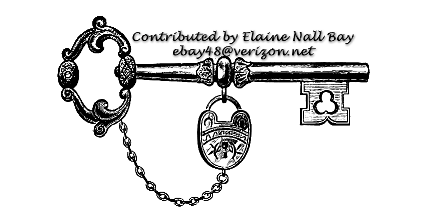 Charles H. Jones Charles H. Jones was
born in Cass Co., Missouri on
October 20, 1861. Charles's
parents, Lycurgus A. Jones and
Martha Ann Younger, were married
on October 5, 1852 in Jackson Co.,
Missouri. His mother, Martha Ann
Younger, is the sister of the
Younger Brothers who engaged in a
life of violence and crime
following the Civil War.
Lycurgus A. Jones brought his family to Denison, Texas in 1881 and entered the furniture store business. The 1887 Denison City Directory lists Lycurgus A. Jones in partnership with the Jones Bros. Lycurgus died in 1897.  Children of Lycurgus A. Jones & Martha Ann Younger
On July 22,
1902, Charles H. Jones and Minnie M. Marsh
were married. Their only child, Janis
Jones was born in 1904. Her death
occurred in 1932. She is buried with her
parents in the Fairview Cemetery in
Denison, Texas.
Charles' family is living on Owning St. along with a widowed sister-in-law, Ida Patton, in 1910. By 1910, they had moved to Gandy St. Charles and Minnie own a home at 1107 W. Sears St. in 1920. His occupation is listed as an employee in a furniture store. A few years prior to his death, Charles sold his interest in the furniture store to his brother Harry A. Jones. He then went into the real estate business. He joined other in the founding of the Denison Hotel and was a leader in the Chamber of Commerce. While on a trip to Dallas with his wife, Minnie, Charles became ill. He died unexpectedly of pneumonia on March 14, 1924. At the funeral, Minnie Jones delivered a moving oration which was quoted in full by the local newspaper.  Mrs. Jones' Tribute My friends—Mr.
Jones and I have invited you into our home
together for the last time. He loved his
home, and he loved to have his friends to
gather around him in his home.
Here in this room, which represented to him his idea of heaven, surrounded by his books each one of which was a warm personal friend to him, we come together to bid him our last farewell. I am sure that all who have come into this home today are friends—loyal and true—who will see nothing inappropriate in what I am trying to do. I feel that you have come to grieve with us—to sympathize, to mourn. You all know the pronounced anti-religious views which Mr. Jones held—so courageously, unfalteringly, even aggressively. He often said he would himself write the things he wished most to have said at his funeral. In looking through his papers nothing of that nature have I found. He has charged me repeatedly not to have anything said at his funeral that would conflict with his views. This has placed me in a peculiar position, in that I could not ask friends who differed with him to speak, nor could I embarrass friends by restricting what they should say; so I decided to write it myself, and in doing so to give as it were his last message to the world. He had the courage of his convictions, and in death he stands fairly for what in life he so consistently upheld. He offers no apology, nor mitigates one iota from facts founded upon scientific research, and he rejects all statements that are upheld only by so-called inspiration or act of faith. He was a seeker after truth. Truth to him was the elemental principle of the universe, and he contended for this undeniable right to use the intelligence he had in deciding for himself which grain was truth and which was not. An omnivorous and intelligent reader, he gleaned from sources far and wide and sifted for himself the grains of truth scattered throughout all knowledge. He did not claim this privilege for himself alone. He conceded to all mankind—Jew, Gentile, Catholic or Protestant, Christian or heathen—the right of each individual to gather his truth in whatever way he chose and to abide by the convictions he is compelled to arrive at—therefore freedom of thought and the right to express honest convictions were his slogans. He divorced morality and religion—morality to him being the higher term. The fact that one denies the religious tenets such as the divinity of Christ, the doctrine of the trinity, the infallibility of the pope, the inspiration of the Bible, did not in his opinion brand a man as immoral. Morality is based upon conduct alone and not upon beliefs, and all who knew him can attest that in his case a more moral, upright, honest, honorable man never lived. His insistence upon his privilege of thinking as he must, according to convictions based upon evidence, did not in the least mean that he was free to live without moral restrictions. On the contrary, he thought he was under the greater obligation to lead a clean, wholesome, moral life in order to deny that freedom of thought and freedom of morals are identical. They are not, my friends, and his life proves it. He was an avowed atheist, or free thinker, or what to me seems to be a better word, more fully expressing it—a truth seeker—and such being the case, he held views widely apart from those held by most of you here today. If Mrs. Jones were right in his views, he maintained, he is now at rest, and I am content. If he were wrong, he is now happy in the reunion with loved ones gone before, and again I am content. What matters it, my friends? The thing to judge a man by is his life here and now, and if its heritage is such to inspire or to blast. All who knew Mr. Jones knew that a more noble, more inspiring life was never lived than his. After twenty-two years of intimate association with him, I was constantly striving to reach a higher goal of living, trying to attain a perfection that he seemed to be always pointing to unconsciously—never by word. It was merely the power of righteous living so simply performed, so matter of fact, so taken for granted that it glowed like a burning coal in a dark grate. He did not have to be. He simply was. A friend in Dallas yesterday, with streaming eyes and choking voice, said to me: "Miss Minnie, he was the best friend I had, the finest man I ever knew, and the real beauty of it was that he himself was perfectly unconscious of being so." He was one's best friend to all humanity; a lover of nature, scenery, tall waving trees, wide expanses, beautiful vistas. Mother earth delighted him, as it does all simple souls. A tender father, a devoted husband, a loving son and brother. "None knew him but to love him, nor named him but to praise." Such is the man with whom today we come to the parting of the ways. Shall we meet again? He thought not, perfectly content to return to the oblivion from which he sprang. But whether we do or not, the stroll we have taken together through this little second of eternity is so fraught with beauty, with love, with all that any life could offer that is worthwhile that it alone pays for its having been. And whether he wishes it or not, he lives again in the beauty of his simple and loving life—an inheritance to those left behind. To him this world was the place to be happy in, and one's duty was to make happiness for others; no trappings of woe nor habiliments of grief to dampen the spirit of others—such were his preachments; "Smiling Thro" his motto; and you, my friends, who knew him, know, too, how he carried them out. This is not such a paper as he would have written. It does not set forth his views so powerfully as he would have presented them. It would not meet with hi approval had he been consulted. He was modesty personified. But, my friends, a mistaken modesty forbids giving one his due of righteousness. Justice is indeed blind. "We come to bury Caesar—not to praise him," cries the offended multitude. So be it. The best friend I had; the finest man I ever knew. And now, my friends, I ask you to come with me to the open space where in silence and in reverence we will return to mother earth the son who loved her so well. After the casket is lowered, it is my wish that all return to their usual haunts of life, leaving me, alone, to cover the sacred spot with these beautiful flowers you have so kindly sent. We thank you.  Crossing the Bar Sunset and evening star, And one clear call for me! And may there be no moaning of the bar, When I put out to sea, But such a tide as moving seems asleep, Too full for sound and foam, When that which drew from out the boundless deep Turns again home. Twilight and evening bell, And after that the dark! And may there be no sadness of farewell, When I embark; For tho' from out our bourne of Time and Place The flood may bear me far, I hope to see my Pilot face to face When I have crost the bar. —Tennyson View page of Henrietta Younger Rawlins 
 Biography Index Susan Hawkins ©2025 If you find any of Grayson County TXGenWeb links inoperable, please send me a message. |
